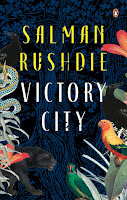
The Immigrant
By Manju Kapur
My week of Indian women writers. Manju Kapur is of course of a different generation from Madhavan. And of quite a different sensibility. Her forte is writing nuanced realistic accounts of the quiet desperation millions of middle class Indian women live through and fight; of the daily struggle for individual identity against a society beset with rules that submerge it; of the tussle between the personal and the public persona. The women in her novels all in their own way fight for and pay a price for self-affirmation.
The Immigrant is Nina, a 30 year old unmarried lecturer at Miranda House in Delhi University, living with her widowed mother, who has little to dream about than her daughter’s marriage. The setting is India during the emergency and when a proposal comes from a dentist settled in Canada, there is little resistance that Nina offers. Ananda seems decent and nice; India during the Emergency had little to offer a young English lecturer and her mother is over the moon over her daughter’s prospects.
Nina goes to Halifax, Canada and slowly tries to assimilate. It is a struggle for her – her first experience at the immigration counter is humiliating, she has to put away her lovely sarees for ill-fitting jeans and shirts, her education and teaching experience count for nothing and she is forced to sit idle at home, the family support and infrastructure that you so easily take for granted back home is completely missing. But the most difficult is the adjustment on the home front – to a husband with a sexual dysfunction that leaves her frustrated and childless. It creates a wedge in their marriage that is not helped by a basic difference in their interests and passions. It drives both of them to look elsewhere for pleasure and the unraveling of the immigrant dream begins.
Eventually Nina finds her niche, at least professionally. And when her mother dies unexpectedly, Nina is for the first time left completely alone in the world, freeing her up to take decisions that let her assert her individuality beyond what is seen as norm – to pick up newer spots to lay down fresh roots, to re-invent herself, to form new friends and family.
The Immigrant is an exploration of the psyche of a woman who journeys away from everything familiar to a land and people completely unknown. It is a journey that is much more than the physical; one that gets Nina finally to a place of affirmation of identity and personal choice. It is not an easy place, but it is one she has created for herself.
As is expected, Manju Kapur does not disappoint with this lovely little book.




